In late 2022, Houston suffered from a water crisis due to failed transformers in water plants that led the local authorities to issue a boil notice. As Houston is the fourth largest city in the United States, the most-read media outlets in the country reported on the incident extensively.
Add to that the reputation of Texas as one of the states with the worst water quality in the country, you’re justified to worry about the tap water quality in Houston.

Let us ease your concerns by letting you know that the city lifted its boil notice after fixing the issue in just two days. Additionally, the latest water quality report shows that the Houston tap water is completely in compliance with the guidelines set by the Environmental Protection Agency (EPA).
Still, let’s delve into what’s in Houston’s water, see whether it’s hard or not, and share more information about where it comes from.
Houston Water Quality Report: What’s in the Water?
The latest water quality report shows that the water in Houston has the following contaminants, albeit within safe limits:
- Copper: The copper presence in the water is mostly due to the erosion of natural deposits. If your house was built before EPA’s lead and copper rule (1991) that prohibited the use of lead and copper components in plumbing fixtures, copper might leach into your water from the plumbing system. The reports show that Houston tap water has only 0.0659 ppm (parts per million) of copper. However, considering both the EPA safety limit and public health goal for this heavy metal (established under the National Primary Drinking Water Regulations) is 1.3 ppm, copper is no cause for alarm for Houstonians.
- Lead: Similar to copper, lead enters water systems through corroding plumbing fixtures and piping systems. If you live in an old house with an old piping system, your water is likely to have some lead. The Houston water quality report detected a lead presence of 1.8 ppb (parts per billion) in the city’s tap water. While the EPA safety limit for this heavy metal is technically 15 ppb, the association has also set its public health goal for lead in drinking water at zero — so, according to them, there’s no safe amount of lead in drinking water. If this heavy metal is present in your water supply, you need to consider a water filter that removes lead.
- Disinfection byproducts: Municipal authorities pump chlorine and/or chloramines into the water system to prevent bacterial infestation inside the pipelines. Yet, when chlorine and chloramines enter chemical reactions with organic matter, they produce total trihalomethanes (TTHMs) and haloacetic acids (HAA5). In Houston’s tap water, there are 29.8-43.2 ppb of TTHMS and 8.2-36.1 ppb of HAA5. The EPA action limits for these chemicals are 80 ppb and 60 ppb, respectively. However, the public safety goal regarding the presence of these contaminants in water is zero, so it’s recommended that you install a relevant water filtration unit that eliminates them.
- Herbicides: There are herbicides such as atrazine (0.21 ppb) and simazine (0.1 ppb) in Houston’s water due to runoff from agricultural activities. The presence of these chemicals is below the EPA action limits — 3 ppb and 4 ppb, respectively. But considering that the EPA has a public health goal of zero for both (because they lead to cardiovascular issues and blood problems as established in the agency’s National Primary Drinking Water Regulations), our recommendation is that you consider installing a good drinking water filter that targets herbicides.
- Hexavalent chromium: Houston tap water has 0.747 ppb of hexavalent chromium. The EPA doesn’t have a specific regulation regarding this metal, but its overall chromium action limit is at 10 ppb, while the public health goal is at 0.02 ppb. Additionally, the latest studies show that there’s a correlation between hexavalent chromium and lung and nasal cancers. So, you might consider installing a hexavalent chromium filter to stay on the safe side.
Houston Tap Water Contaminant Chart
Here’s a chart that allows you to easily compare the contaminant levels in Houston’s tap water, and see how these levels fare against EPA safety limits and health goals.
| Contaminants | Houston Tap Water Levels | EPA Safety (Action) Limit | EPA Public Health Goal |
| Copper | 0.0659 ppm | 1.3 ppm | 1.3 ppm |
| Lead | 1.2 ppb | 15 ppb | 0 ppb |
| TTHMs | 29.8-43.2 ppb | 80 ppb | 0 ppb |
| HAA5 | 8.2-36.1 ppb | 60 ppb | 0 ppb |
| Atrazine | 0.21 ppb | 3 ppb | 0 ppb |
| Simazine | 0.1 ppb | 4 ppb | 0 ppb |
| Hexavalent chromium | 0.747 ppb | 10 ppb | 0.02 ppb |
Is Houston Tap Water Hard or Soft?
Houston tap water has 135 ppm of calcium and magnesium content, so it’s classified as hard water.
The United States Geological Survey considers water that has more than 60 ppm of calcium and magnesium as hard water. If it’s between 60 ppm and 120 ppm, the water is moderately hard; if it’s between 120 ppm and 180 ppm, the water is hard; and if it’s more than 180 ppm, the water is extremely hard.
There are no adverse health effects associated with drinking hard water, but it leaves stains on laundry, dishes, and surfaces, decreases the lifespan of appliances, and can lead to dry skin and dull hair. You can install a water softening system to eliminate these problems.
Where Does Houston’s Tap Water Come From?

Houston has three surface water sources: Lake Livingston, Lake Conroe, and Lake Houston. The Trinity River feeds Lake Livingston, while the other two lakes are fed by the San Jacinto River. These sources make up 86% of Houston’s municipal water supply.
The remaining 14% is underground aquifers: Evangeline and Chicot.
The city utilizes three surface water treatment plants to purify its surface water supplies. The number of underground treatment plants is drastically higher — 49.
The treated water is then fed into six different public water systems scattered around the City of Houston: the Main System, District 73, District 82, Willow Chase, Kingwood, and Belleau Wood.
How Is Tap Water Treated in Houston?
Houston employs a standard tap water treatment system using big water purification plants. In these plants, the water is subjected to the following treatment methods:
- Coagulation and flocculation: A coagulant, like aluminum sulfate, ferric sulfate, or ferric chloride, is first introduced to a big body of water outside the plant. All of these chemicals have a positive electrical charge, which attracts the negatively charged small sediment and contaminant particles. Then, the bonded particles start forming big clumps, also known as flocs.
- Sedimentation: In floc form, the particles that had once flowed freely inside the water start sinking to the bottom. This process is known as sedimentation. After all the flocs settle at the bottom, which takes about eight hours in Houston’s water purification plants, the cleaner water that stays at the top is ready to be transferred to the facility.
- Filtration: Inside the facility, the water is subjected to a variety of giant microfilters. These microfilters remove any impurities that have potentially escaped the coagulation, flocculation, and sedimentation. The microfilters are also effective against contaminants that have no electrical charge and, therefore, can’t be sedimented.
- Disinfection: Like many American municipal authorities nowadays, Houston utilizes two-stage disinfection. First, the authorities pump chlorine to kill bacteria and prevent infestation inside the pipes. Then, they pump chloramines to prevent the bacteria’s (re-)entrance into the water as it’s moving through the pipes.
Does Houston Have the Cleanest Water?
It’s impossible to claim that Houston has the cleanest water with confidence because there are thousands of cities in the United States, and some of them definitely have better water quality than Houston.
However, comparing the contaminant levels in Houston’s tap water with the tap water in other big cities, we can easily say that Houston has safer tap water than most, despite the recent boil notice.
Do People in Houston Drink Tap Water?

Yes, people in Houston drink tap water. However, they also report that the Houston tap water isn’t the best-drinking tap water in the country.
Some Houstonians complain about the chlorine smell they get from the water. If you have a similar complaint and can’t stand the smell of chlorine, you can purchase a water filter that specifically targets chlorine.
Other Houston citizens point out the hardness of tap water in this city. Hard water is, by definition, mineral-rich, and minerals sometimes give the water a bitter taste and hard texture.
However, calcium and magnesium are also essential minerals that help us maintain our muscle functions, bone health, and blood flow. Whether hard water is a good drinking water option for you or not will depend on your preferences and expectations — but it’s not necessarily unhealthy.
Conclusion
The Houston tap water is safe to consume in regards to the National Primary Drinking Water Regulations set by the EPA. It’s treated rigorously with coagulation, sedimentation, filtration, and disinfection. However, this doesn’t mean that it’s completely contaminant-free.
There are heavy metals such as lead, copper, and hexavalent chromium, chemicals such as atrazine and simazine, and disinfection byproducts like TTHMs and HAA5 in Houston’s tap water. That being said, rest assured that you can eliminate all these impurities by purchasing a relevant filtration unit.
Houston’s tap water has a 135 ppm of mineral content, which makes it hard water. If this is a problem for you, you can install a water softener.